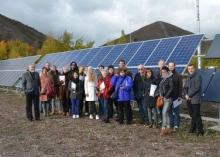The second POCACITO study tour took place last October in Paris, Loos-en-Gohelle and Brussels. Participants were mainly urban practitioners coming from all over Europe, but also from China and the US, many of them representing the 8 POCACITO case study cities. The topics covered climate change adaptation and mitigation, energy transition, innovative urban greening actions, energy-efficient renovation of buildings, local governance and cooperation with citizens and local stakeholders.
Paris: How to build the 2050 vision of carbon neutral cities
Starting the visits in the French capital, our group was invited at the Paris City Hall to attend a conference entitled "Looking far ahead, taking action closely : how to build the 2050 vision of carbon neutral cities". This event, co-organised by the City of Paris and Energy Cities, gathered more than 300 people and presented the results of researchers Gilles Debizet and Stéphane La Branche from the PACTE Laboratory - University of Grenoble Alpes on “Four scenarios for an energy transition in cities by 2040”. See below for a video summary of these scenarios:
Two round tables then gave the floor to the Cities of Vienna and Frankfurt, focusing on their path "Towards carbon neutral cities" and "100% renewable territories".
In the afternoon, our group visited an experimental rooftop garden, as an example of the Paris Greening Programme, part of the adaptation strategy of the Paris Climate Plan.
We finished this first day with a visit of the Halle Pajol, a pilot project of a railway brownfield rehabilitation in the heart of Paris. Amongst many remarkable environmental and architectural elements of this renovation project, a 3,500 m2 PV solar roof installation makes it the second biggest European solar plant in an urban area.
Loos-en-Gohelle: a stunning ecological transition in an ancient mining area context

The second day of visits, led us to Loos-en-Gohelle, a French pilot town for sustainable development, located in an ancient and devastated coal mining area. Here, we could see how a new local eco-system has managed a smooth transition, with tangible results in economic, social and environmental fields. This was triggered in particular by the involvement of residents and the emergence of new economic models. The French Agency for Environment and Energy Management, ADEME, supports this initiative and has cited it as an example in France for those seeking support in their transition.
Brussels: Climate plan and strategy for building renovation

The agenda of our last day of visits in Brussels, hinged on both the Brussels-Capital Region and the City of Brussels climate plans, with very interesting exchanges between the participants, representatives from the City of Brussels and from Brussels Environment, on how the two levels of governance interact. A focus was made in the afternoon on the Brussels-Capital Region policy in the field of sustainable building, including technical site visits from the “Be.Exemplary” call for projects.
Download the complete programme of the visits
See all the pictures of the tour on Flickr
Stay tuned for the latest results of POCACITO that will be published in the upcoming weeks: EU roadmap, policy briefs, scientific papers, case studies...


